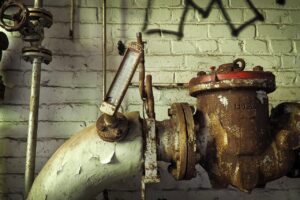When water pipes burst, the damage done can be extensive, especially if the location of the burst pipes are not discovered quickly. Burst pipe damage doesn’t just affect the occupants of the building where the pipes have burst or closest to where the pipes burst. It can have an effect on neighboring buildings and their occupants. Who is liable when the damage caused by burst water pipes spreads to neighboring properties? There is no easy answer to this question as a number of factors involved must be taken into account before liability is determined and compensation, if any is due, can be negotiated. This article explores the issues involved in deciding liability when burst pipes damage neighboring properties.
What causes water pipes to burst?
The most common reason for burst pipes, on many property owners’ minds in freezing winter months, is when the water inside a section of piping expands, a natural physical phenomenon of water when it freezes. Encased inside a pipe which doesn’t expand to accommodate the extra volume of ice can lead to a rupture at its weakest link. If not detected soon enough, the burst pipe will start to disgorge its liquid contents through the ruptured section when the ice melts again. The worst scenario is when the building where the burst pipe occurs has been left vacant with the main water supply valve left open.
Burst pipes can also occur when the integrity of plumbing supplies is compromised during violent storms, earthquakes and construction or demolition work. Earthquakes may not be a serious risk in Massachusetts, but where buildings are still supplied by older (pre-1980s) cast iron water pipes, corrosion can be a ticking time bomb, pipes slowly deteriorating below ground or hidden by walls, ceilings and paneling.
The building owner is primarily liable for the damage done by burst pipes
In most cases, the owner of the building where the water pipe burst, is responsible for the damage done by any flooding after a rupture. This doesn’t automatically mean that neighbors are affected. If the affected structure was a detached building, for instance, potential flooding damage would probably be localized to that building. The rupture would have to be very severe to affect other properties downstream. There are things that any property owner can do to limit their own liability in the event that damage from a burst pipe could spread to neighbors if they live close by, or in an adjoining apartment.
Simple things like making sure that pipes are inspected before winter, or after recent construction work and are adequately insulated on advice from plumbers. The water supply to outside pools and faucets can be disconnected before winter sets in. If the building is to be vacated for any length of time, the main supply can be turned off and water drained from taps and faucets inside the building. These sorts of strategies can help to prevent a burst water pipe and prevent a potential dispute and lawsuit from an unhappy neighbor if the worst was to happen.
Responsibility for the damage done by burst pipes also lies with the landlord if the property affected is rented out to a tenant. If a water pipe bursts during the tenancy and damage from flooding affects tenants’ own property and /or that of neighbors, then the landlord will normally be liable for compensating all those people affected. Exceptions might occur if the landlord can prove that the burst pipe was the fault of the tenants, or some external party. For example, if nearby construction work outside the building had caused damage to the pipe to the building, then the property owner would be seeking compensation from the construction company. A burst water main, for example, caused by corrosion or poor maintenance by the municipal or commercial supplier, may mean that liability for damage done to downstream properties is not the property owner’s responsibility and compensation will be sought from the relevant party.
Property owners in Massachusetts are advised to check to make sure their insurance policies cover them for potential damage caused by burst pipes. Insurers may have a clause that does not cover property owners if there has not been a recent inspection of the plumbing, or proof of adequate insulation provision. Property owners whose properties adjoin those of their neighbors may wisely think about taking out extra liability cover for potential damage to neighbors’ property if a burst occurs.
Liability for damage done by water pipe bursts in a condo
Condos are some of the most likely properties to be affected by flooding following a burst water pipe in the property above, or in an adjoining property. There is often a network of water pipes that radiate out to all the condos in a building from the main supply. A water pipe burst that occurs in part of that network not specifically located in any one property would typically mean the condo association is potentially liable for compensation, the association having the responsibility for maintaining and repairing common infrastructure.
Otherwise, the rules outlined above for other types of buildings apply to condo flooding as well. If the pipe burst occurs within any one condo property and goes on to flood a neighbor, then liability for the damage done would most likely lie with the owner of the first affected property.
Seek advice from an attorney if you have been affected by flooding from a neighbor
If you notice flooding in your property and suspect that it is coming from outside, then the first step is to get the flooding stopped as soon as possible. Only then can you start to assess the damage done to your own property and what compensation you may be seeking. You may need to seek advice about what your legal situation is and your own insurer and an attorney may be the best placed to help you with the steps you need to take.
The cause of the burst pipe, the exact location of the rupture, who was responsible for its maintenance and how much it has cost you, must all be considered before negotiating with whoever is then considered liable. In many cases, when liability is clear cut, you may be able to obtain compensation without having to making a claim on your own property insurance. If the damage done is relatively slight, you may be able to file a claim through the small claims court. If you believe that another party is liable for the damage done to your property but is reluctant to provide compensation or refuses to negotiate, then you may have to resort to a lawsuit if you have clear proof of liability. In most cases, this will mean getting professional legal assistance from a qualified attorney.


